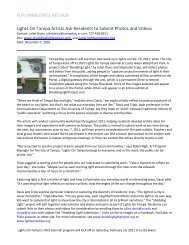Roland Barthes â Mythologies - soundenvironments
Roland Barthes â Mythologies - soundenvironments
Roland Barthes â Mythologies - soundenvironments
You also want an ePaper? Increase the reach of your titles
YUMPU automatically turns print PDFs into web optimized ePapers that Google loves.
integration of Roman capillary habits with the general morphologyof the characters he usually portrays. Conversely, one cannotbelieve in Julius Caesar, whose physiognomy is that of an Anglo-Saxon lawyer - a face with which one is already acquaintedthrough a thousand bit parts in thrillers or comedies, and acompliant skull on which the hairdresser has raked, with greateffort, a lock of hair.In the category of capillary meanings, here is a sub-sign, that ofnocturnal surprises: Portia and Calpurnia, waken up at dead ofnight, have conspicuously uncombed hair. The former, who isyoung, expresses disorder by flowing locks: her unreadiness is, soto speak, of the first degree. The latter, who is middle-aged,exhibits a more painstaking vulnerability: a plait winds round herneck and comes to rest on her right shoulder so as to impose thetraditional sign of disorder, asymmetry. But these signs are at thesame time excessive and ineffectual: they postulate a 'nature' whichthey have not even the courage to acknowledge fully: they are not'fair and square'.Yet another sign in this Julius Caesar: all the faces sweatconstantly. Labourers, soldiers, conspirators, all have their austereand tense features streaming (with Vaseline). And closeups are sofrequent that evidently sweat here is an attribute with a purpose.Like the Roman fringe or the nocturnal plait, sweat is a sign. Ofwhat? Of moral feeling. Everyone is sweating because everyone isdebating something within himself; we are here supposed to be inthe locus of a horribly tormented virtue, that is, in the very locus oftragedy, and it is sweat which has the function of conveying this.The populace, upset by the death of Caesar, then by the argumentsof Mark Antony, is sweating, and combining economically, in thissingle sign, the intensity of its emotion and the simplicity of itscondition. And the virtuous men, Brutus, Cassius, Casca, areceaselessly perspiring too, testifying thereby to the enormousphysiological labour produced in them by a virtue just about togive birth to a crime. To sweat is to think - which evidently restson the postulate, appropriate to a nation of businessmen, thatthought is a violent, cataclysmic operation, of which sweat is only25the most benign symptom. In the whole film, there is but one manwho does not sweat and who remains smooth-faced, unperturbedand watertight: Caesar. Of course Caesar, the object of the crime,remains dry since he does not know, he does not think, and so mustkeep the firm and polished texture of an exhibit standing isolatedin the courtroom.Here again, the sign is ambiguous: it remains on the surface, yetdoes not for all that give up the attempt to pass itself off as depth.It aims at making people understand (which is laudable) but at thesame time suggests that it is spontaneous (which is cheating); itpresents itself at once as intentional and irrepressible, artificial andnatural, manufactured and discovered. This can lead us to an ethicof signs. Signs ought to present themselves only in two extremeforms: either openly intellectual and so remote that they arereduced to an algebra, as in the Chinese theatre, where a flag on itsown signifies a regiment; or deeply rooted, invented, so to speak,on each occasion, revealing an internal, a hidden facet, andindicative of a moment in time, no longer of a concept (as in the artof Stanislavsky, for instance). But the intermediate sign, the fringeof Roman-ness or the sweating of thought, reveals a degradedspectacle, which is equally afraid of simple reality and of totalartifice. For although it is a good thing if a spectacle is created tomake the world more explicit, it is both reprehensible and deceitfulto confuse the sign with what is signified. And it is a duplicitywhich is peculiar to bourgeois art: between the intellectual and thevisceral sign is hypocritically inserted a hybrid, at once ellipticaland pretentious, which is pompously christened 'nature'.26




